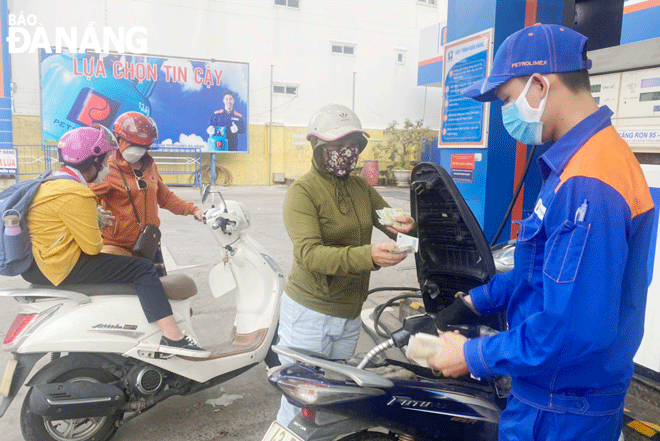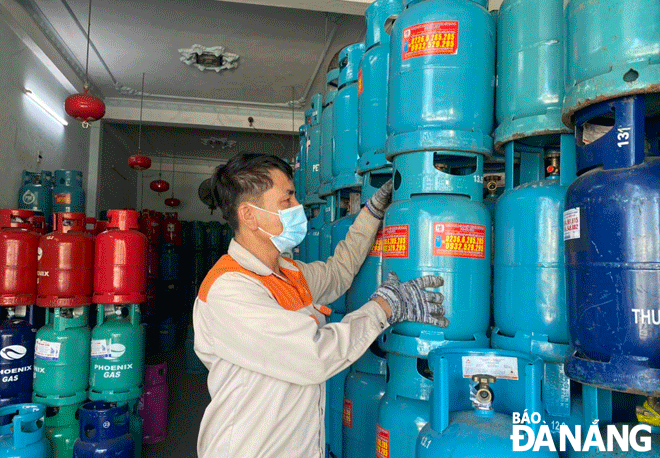Sharp hikes in petrol, gas prices: Great impact on living expenses, production and business
Viet Nam’s petrol prices climbed to a new peak on March 1 and this adjustment was the sixth consecutive fuel price hike since the beginning of this year. While the incomes of many people nationwide are still being adversely affected by the COVID-19 pandemic, the gasolineand gas price hikes is leading to a simultaneous increase in the prices of some foods, thus levying great impact on the daily life of residents and corporate production and business operations.
 |
| High gasoline prices have a great impact on life, production and business. A motorcyclist has her vehicle re-filled at the filling station on Nguyen Van Thoai Street, Ngu Hanh Son District on the afternoon of March 1. Photo: QUYNH TRANG |
Gasoline prices soar to all-time high
The price of gasoline E5RON92 leapt VND540 to VND26,070 per litter, while that of RON95-III increased VND550 to VND26,830 per litter from 3:00 pm on Tuesday, following a notice released by the Ministry of Finance and the Ministry of Industry and Trade. (US$1 = VND22,815)
Oil products, meanwhile, jumped VND470-530 for each liter sold.
These prices surpassed the previous peak reached in July 2014.
Upon being heard of the petrol price rise, Mr. Nguyen Van Huy, a driving instructor, residing in Son Tra District complained : “The continuous increase in petrol prices causes difficulties for people active in transport-related professions like us. On average, every month, I has many vehicle refilled with nearly 100 liters of gasoline, which costs a lot. As a resident, I hope that the Ministry of Industry and Trade should soon take feasible solutions to stabilize gasoline and oil prices in the coming time".
Sharp hikes in gas prices
As recorded at gas stores on March 1, most stores have adjusted the new gas prices. Specifically, the retail price of Petrolimex gas (including VAT) is VND 500,000 / 12kg cylinder, an increase of VND45,000 VND compared to the selling price in February.
Likewise, PetroVietnam gas retail price (VAT included) is VND473,000 VND/12kg cylinder, 42,000 VND higher than the figure recorded in February.
The high gas prices have imposed a heavy burden of living expenses on many housewives, especially workers and labour living in financially difficult circumstances.
Great impact on production and business costs
Gasoline and oil are important input materials for many production industries, so their price hikes as recorded over recent times have adversely affected on corporate production and business costs.
Therefore, the public concern is raised that once the price of input fuel increases, it will put great pressure on manufacturers and businesses and force them to increase the prices of goods, and finally consumers themselves suffer from the consequences. This means that consumers will have to pay the increased bills for their goods purchases due to higher gasoline and oil prices.
Besides, the hike may increase the cost of products and reduce the competitiveness of domestically - produced goods as well, thus affecting the local economic growth.
The escalating oil and gas prices would reduce and even neutralise the effect of the 2-per cent VAT cut which was intended to stimulate consumer spending, stir growth and reduce inflation pressure.
 |
| The increase in gas prices on the first day of March has pushed up consumption costs, making it even more difficult for poor workers (Photo taken at Anh Buu gas store on Ngo Quyen Street, Son Tra District). Photo: QUYNH TRANG |
Dr.Ph. Tran Xuan Quynh, a lecturer at Faculty of E-commerce, the Da Nang University of Economics, acknowledged that, in the short term, gasoline prices will remain high in the near future for two main reasons.
One is that the ongoing armed conflict in Ukraine has led to instability in petroleum supplies, the other is that the interruption of production activities of Nghi Son oil refinery, Viet Nam’s largest refinery, since January due to financial problems has caused domestic petroleum shortages, which ultimately resulted in higher prices. Therefore, although gasoline price may adjust down to a certain extent, it will basically still maintain the upward momentum and high level.
“From the perspective of consumers, the increase in gasoline prices pushes the consumer price index (CPI) up, causing people's living costs to go up as well. This may cause apprehension and reduce consumer demand in unnecessary services, potentially resulting in inflation, adversely affecting retail growth, and the entire economy as a whole. Inflation will lead to big fluctuations in commerce, and the retail sector in particular, from restructuring items (such as reducing spending on luxury goods), restructuring supplies (reducing transportation and energy costs), and causing investors to turn reluctant to develop new projects. In the near future, inflation will be a permanent threat, creating room for the State's macro-regulatory policies to more narrow. In the long term, macroeconomic balances need tto be taken into account to ensure a balance between economic stimulus solutions and maintaining a reasonable level of inflation, keeping the macro economy stable”, Quynh analyzed further.
Reporting by QUYNH TRANG - Translating by A.THU








